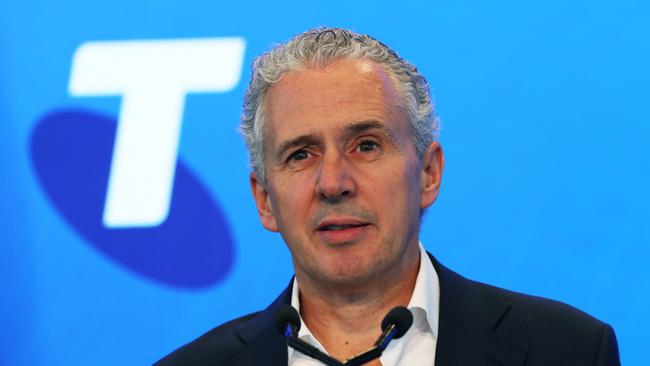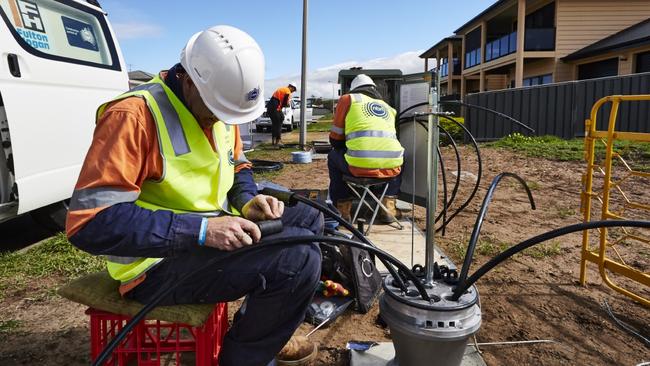Telstra surprised by NBN business ambitions
Telstra hits out at NBN Co’s pursuit of business customers — a market it traditionally dominates.

Telstra boss Andrew Penn has cried foul over NBN Co’s aggressive chase of business customers, labelling it a “surprising” intrusion into a market where private sector telcos are battling it out.
Mr Penn said NBN Co’s business ambitions were particularly puzzling at a time when the pace of the network rollout had slowed.
“NBN going into the business market was a surprise for us … it’s not something I expected them to do. I had understood that the purpose of the NBN was to deliver broadband connectivity to every household in Australia, not roll out fibre to businesses,” he said.
“On one hand the rollout is slowing but on the other hand they are diverting capital into building more fibre where it’s not necessary.”
NBN Co last Friday flagged that it will have half a million fewer homes connected to the network by June 30, 2020, forcing to Telstra to cop a $400m hit to its revenue for financial year 2020.
With 600,000 businesses currently using the NBN network it poses a serious risk to Telstra’s Enterprise division, which is struggling to hold on to small to medium business customers (SMBs).
Telstra’s net promoter score (NPS) for SMB business has slipped to -37 during the last financial year amid concerns that the telco is only interested in serving big tier-1 customers.
The head of Telstra’s enterprise unit, Michael Ebeid, told The Australian that overall NPS for the division was in positive territory but the telco was changing its strategy in the mid-market segment.
“Our NPS for overall enterprise unit is positive but it’s a negative score for small business customers and what we have done as part of our latest restructure is relook at how we can service these customers and we are starting to see the score improve.”
Telstra has already rejigged its enterprise sales strategy, with 1200 jobs cut and the creation of two separate sales teams. Industry sources told The Australian that the changes are yet to fully win over mid-market customers and the NBN offers Telstra’s rivals an opportunity to target that segment of the market.
Under the new structure, Telstra’s 800 largest enterprise and government customers will be served by a dedicated team, while the rest of the businesses will be managed through a “Digital Hub” in Adelaide.
Telstra has historically been the wholesale network access provider for the likes of Optus, Vocus and TPG Telecom. While Vocus and TPG have their own fibre networks that provide enterprise services, their network footprint is not as expansive as Telstra’s.
“There’s no doubt that the NBN coming in has an impact and it diverts capital away from its core purpose,” Mr Penn said.
“In terms of how we respond, we already have a very good network and the quality of it is very different to the NBN and we do also resell some services over the NBN as well.”
Mr Ebeid added that Telstra was ready to work with NBN Co when required.
“There is a demand for fibre and what we are doing is making sure we look at the difference in what the capacity needs are, for some customers it makes good economic sense for us to use the NBN and we will.
“Where it makes good sense for us to invest our own capital in fibre we will do that as well,” he said.
“I suspect we will do more deals with NBN Co to leverage their network and that’s a good thing.”

NBN Co is targeting $1bn in revenue from business customers by financial year 2022. The business focused services contributed $388m to NBN Co’s overall revenue in financial year 2019 and the company told The Australian that connecting businesses has always been part of its remit.
“Providing competitive offerings to help meet the needs of business has always been part of NBN Co’s intent,” a company spokesman said.
“The market is responding well to our value proposition of flexible products, service model and retail contestability.”
Faced with increased competition, Telstra has also launched a new managed IT services business on Wednesday to reinforce its appeal to the SMB customers.
The unit, dubbed Telstra Purple, will offer an end-to-end solution to businesses as they work to digitise their operations.
“(Telstra Purple) is about repackaging and consolidating the services we already provide in the market, and positioning us for the next wave of technology,” Mr Penn said.
Telstra has bought a number of technology solutions business in the last four years, such as solutions developer Readify, as well as network integrators O2 Networks, NSC Group and Kloud.
According to Mr Ebeid, the new business unit will help Telstra reassert its presence in the mid-market.
“This is the turnkey solution that our customers have been asking for some time.”
He added that Telstra Purple will harness the capabilities of these businesses and offer it as a single offering to mid-market customers.
“These brands have done a great job in serving our big corporate and government customers and what we are seeing in the mid-market is that more customers need help with moving applications to the cloud and more security.”
“So the demand is absolutely there and it’s a big growth segment for our enterprise (division),” Mr Ebeid said.
Telstra Purple services will be provided in Australia, Singapore, Hong Kong and the UK.



To join the conversation, please log in. Don't have an account? Register
Join the conversation, you are commenting as Logout